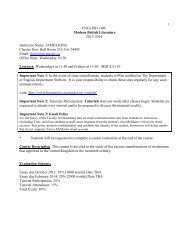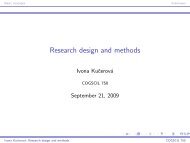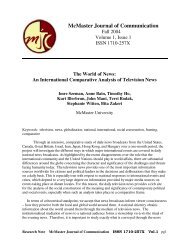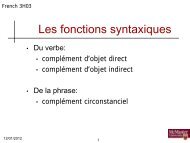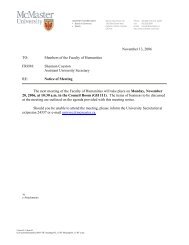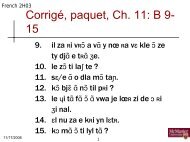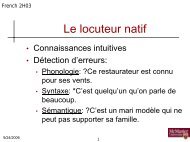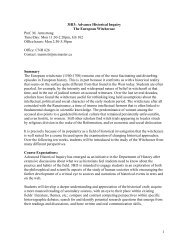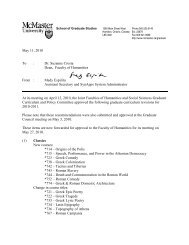The Syntax of Givenness Ivona Kucerová
The Syntax of Givenness Ivona Kucerová
The Syntax of Givenness Ivona Kucerová
Create successful ePaper yourself
Turn your PDF publications into a flip-book with our unique Google optimized e-Paper software.
(97) a. And what will he read and translate?<br />
b. Bude číst detektivky a překládat romány.<br />
will-he read detective mysteries and translate novels<br />
‘He will read detective mysteries and translate novels.’<br />
(98) a. And what did he read and translate?<br />
b. #Četl detektivky a překládal romány.<br />
read detective mysteries and translated novels<br />
‘He read detective mysteries and translated novels.’<br />
I do not know at this point how to account for the difference between past and future.<br />
Intuitively, the past form <strong>of</strong> ‘read’ is not given in the same sense as the future form <strong>of</strong> ‘read’.<br />
<strong>The</strong>re is something about the shared object that seems to make a difference for givenness.<br />
My hope is that these cases contain coordination reduction and the contrast between implicit<br />
objects in past and in future is related to a structural difference. I leave the question<br />
<strong>of</strong> differences among VP coordinations as a puzzle for future research.<br />
For now, let’s assume that verbal coordinations are <strong>of</strong> different types and that it is possible<br />
to reduce all relevant verbal coordinations to propositional domains. We can conclude<br />
that the G-operator can always be adjoined below the first verbal conjunct without leading<br />
to Presupposition failure.<br />
Notice that we have shifted our reasoning that the difference between nominal and verbal<br />
coordination is related to existence or non-existence <strong>of</strong> a pronominal counterpart. <strong>The</strong><br />
existence <strong>of</strong> a pronominal counterpart is relevant only in an indirect way. <strong>The</strong> reason why a<br />
verbal coordination asymmetrically c-commanded by new material is felicitous is not that<br />
there is no better tool to mark givenness. <strong>The</strong> reason is that such a coordination is a propositional<br />
domain. Thus, the G-operator can be safely inserted. <strong>The</strong> situation with coordinated<br />
DPs is rather different. <strong>The</strong>re is no way to insert the G-operator without Presupposition<br />
failure. Thus, invoking givenness lexically is the only grammatically suitable option the<br />
language has.<br />
What about adverbs? Recall that adverbs are sensitive to ordering within a coordination<br />
but they do not need to be pronominalized even if there is a pronominal counterpart available.<br />
I argue that adverbs can always be adjoined at a propositional level. Thus, an adverbial<br />
coordination is always located on the left edge <strong>of</strong> a propositional domain. <strong>The</strong>refore,<br />
inserting a G-operator below the first conjunct is always felicitous. <strong>The</strong>re is one problem<br />
remaining: we have defined the reference set as a set containing derivations based on the<br />
same numeration and the same assertion. Presumably, DPs and their pronominal counterparts<br />
are not part <strong>of</strong> the same numeration. Even though there might be a more principal<br />
solution <strong>of</strong> the problem, for now I will stipulate that pronouns may be part <strong>of</strong> the reference<br />
set as well. 18<br />
18 One option would be to treat pronouns as DP ellipsis, as has been suggested in Postal (1966) and further<br />
developed in Elbourne (2005).<br />
119



